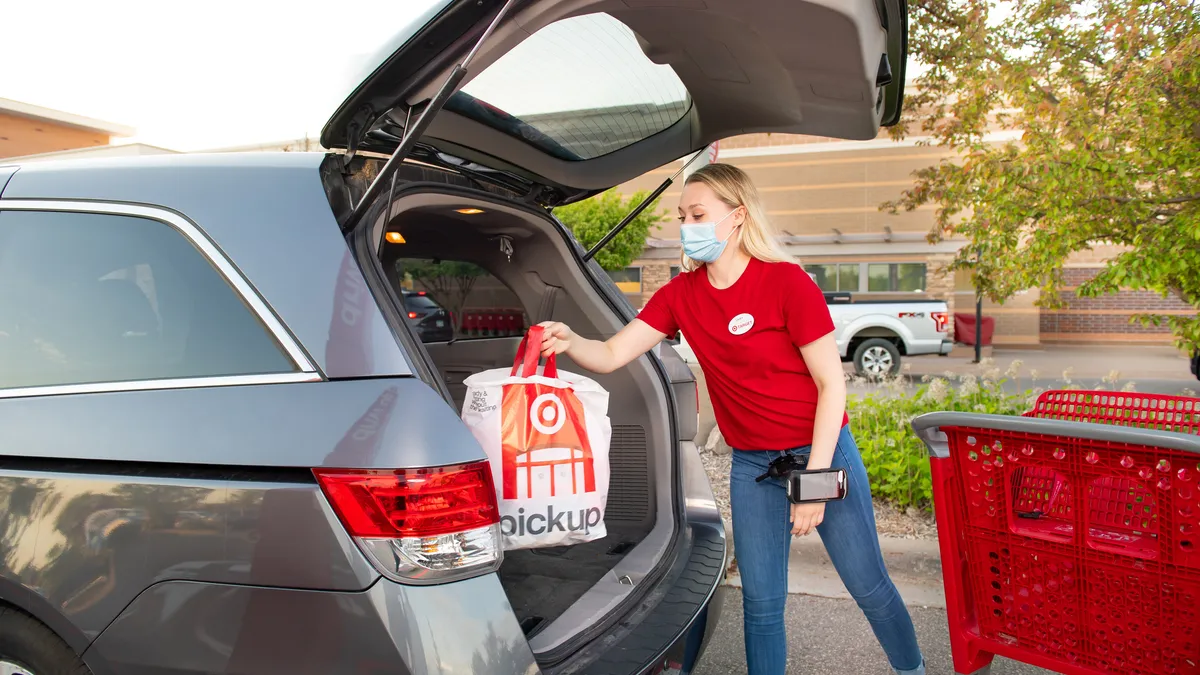Dive Brief:
- Despite a tough comparison against last year's gains, Target grew its sales and market share significantly in the first quarter. First quarter comparable sales grew 22.9%, with store comps up 18% from last year's 10.8%. Operating income rose 407% to $2.4 billion in Q1.
- As consumers become more comfortable going out and gathering, events like Mother's Day drove sales, Target said Wednesday. Target's total Q1 revenue grew 23.4% to $24.2 billion, driven by apparel sales increasing more than 60%, and home and hardline sales both up over 30%.
- Target's private label blitz also reaped rewards this quarter. Sales for its owned brands grew 36% — the strongest the retailer has recorded.
Dive Insight:
Though its digital channels were the primary driver last year in Q1, Target executives largely credited store comps for its results so far this year — staying true to its mission of putting stores at the center of its business.
Meanwhile, digital comp sales growth slowed to 50%, compared to last year's whopping 141% growth, and same-day services increased over 90%. The company said in April that it is testing out a faster method to fulfill deliveries using the new sortation center in Minneapolis.
"Stores continued to be the linchpin of Target's online capability, once again validating management's strategic decision to position them at the center of its online flywheel, with ship from, in store-pick-up, and curbside all benefitting, resulting in continuing robust online sales growth as consumers avail themselves of these flexible options," Moody's Vice President Charlie O'Shea said in emailed comments.
For Q1, more than 95% of Target's total sales were fulfilled by store assets and inventory. The retailer's emphasis on its stores prompted its $4 billion annual investment to put up additional locations, improve fulfillment and update existing stores over the next few years.
As more consumers get vaccinated and the threat of the virus slowly wanes, Target's senior executives told investors and analysts in a call that the company is expecting events and celebrations — such as Father's Day and back-to-school shopping — to prompt consumers to spend.
"We've seen an enthusiastic return in in-store shopping. Guests are happy to come back to our store because they love the environment we created and invested in over time," Target's Chairman and CEO Brian Cornell said during the call. "As a result, our store comp sales increased 18% in Q1, driven almost entirely by higher traffic, and accounting for the vast majority of our growth."
Target's private label launches have proven to be an effective tool to drive sales, as shown in its first quarter results. A recent Profitero report shows Target has the highest share of private labels in search results, exceeding Walmart and Amazon. Target's activewear brand, All in Motion, generated $1 billion in its first year. The retailer also launched its first crafting label in over a decade, dubbed Mondo Llama.
But compared to the first quarter of 2020, when shoppers were stocking up on goods and groceries, Target experienced low- to mid-single-digit sales on both essentials and food and beverage.
Still, Target gained $1 billion in market share in the first quarter of 2021 on top of the $1 billion it earned around the same time last year.
Despite the high figures to beat from the previous fiscal year, Target expects a mid-to-high single-digit increase in comp sales in the second quarter and positive single-digit comp sales growth in Q3 and Q4.
"Although it is lapping tougher comparatives from last year, Target shows no signs of slowing down," Neil Saunders, Managing Director of GlobalData, said in emailed comments. Though shoppers were picky about what they bought with their discretionary funds, Saunders added that Target still claimed many of those dollars because it "has invested heavily in creating an interesting and compelling proposition that has mass appeal."














